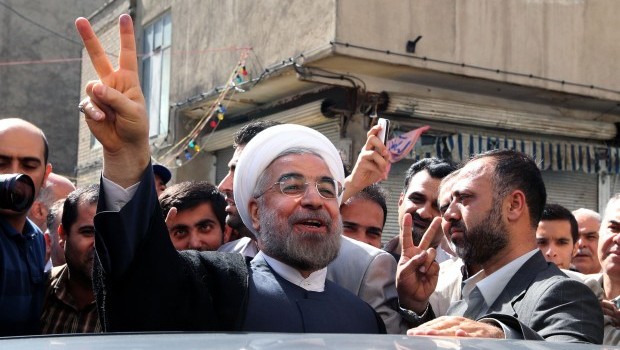
Taken on June 14, 2013, Iranian moderate presidential candidate, Hassan Rouhani (C) flashes the sign of victory as he leaves a polling station after voting in Tehran. (AFP/Atta Kenare)
London, Asharq Al-Awsat—Hassan Rouhani has been announced as Iran’s president-elect in a surprising victory over the principalist/conservative faction. More than 36 million Iranians went to the polls on Friday, representing a voter turnout of 72.7%.
Iran’s interior ministry confirmed the final vote count, which saw Rouhani elected as Iran’s 11th president, succeeding outgoing president Mahmoud Ahmadinejad.
Hassan Rouhani won the election with 18,613,329 votes, winning 50.7% of the vote. Mohammad Baqer Qalibaf, mayor of Tehran came second with 6,077,292 votes, achieving 15.7% of the vote.
Qalibaf was the principalist camp’s front-runner, promoting himself as a strong candidate who would deliver on his election promises, unlike outgoing president Ahmadinejad who completely failed to fulfill his economic justice platform.
The voter breakdown for yesterday’s elections is indicative of the factional division in Iran’s political arena. Rouhani, backed by moderates and reformists, secured more than 50.7% of votes, while the remaining 18 million votes were spread out across the other five candidates.
Rouhani is known to be a moderate politician, with the required skills to negotiate constructively. His political and professional skills will enable him to maneuver within the very complex nature of the Iranian state.
Saeed Jalili, Iran’s top nuclear negotiator and a staunch supporter of Iran’s intransigent foreign policy, came third with only 4,168,946 votes (11.3% of vote).
Former commander of the Islamic Revolutionary Guards Corps (IRGC) Mohsen Rezaie landed in fourth place with 3,884,412 votes, obtaining 11.16% of the popular vote.
Former foreign minister Ali Akbar Velayati only managed to secure 6.18% of votes, putting him in fifth place, while Seyed Mohammad Qarazi only received 446,015 votes, or 1.22% of the total vote.
Unlike the previous election in 2009, when the election results were announced quickly, Iranian interior minister Mohamamd Najar emphasized that “we will not sacrifice accuracy and transparency for a quick vote count,” according to ISNA news agency.
Rouhani’s victory comes following surging popularity in the run-up to Friday’s election, and despite widespread speculation that the elections would go to a runoff vote as no candidate would be able to secure the 50% votes required for an outright win.
After casting his vote on Friday morning, Iranian Supreme Guide Ayatollah Khamenei urged all officials to ensure that people’s votes are counted with maximum accuracy. The supreme leader reminded Iran’s officials that “these votes are hagh al-naas (the people’s rights),” reiterating the importance of protecting people’s rights under Islamic Shari’a law, according to Iranian state television.
Friday’s vote saw extremely high voter turnout. A number of analyses have been put forward to explain this. Rouhani’s election shows that the Iranian people and establishment agree on the need for the government to modify its domestic and foreign policies.
Rouhani’s track record and political platform place him in the center of the Iranian political spectrum, raising hopes of a less troubled domestic political scene in the future. He has promised to unlock Iran’s foreign policy, in particular Tehran’s stand-off with the P5+1 over the nuclear file.
It is true that Supreme Guide Ayatollah Khamenei is ultimately in charge of Iran’s foreign policy, but the new administration may be able to restore Iran’s place in the international community, particularly given the economic challenges facing the country.
Although moderates and reformists will no doubt be pleased by the election results, Ayatollah Khamenei will also be pleased, particularly given the high voter turnout.
Rouhani’s campaign symbol is a key, and he pledged—in front of millions of viewers—to unlock Iran’s problems both in terms of the economy and the international sanctions on the Tehran’s regime.
Rouhani’s success in solving Iran’s nuclear issue will be subject to whether he can take over on Iran–US rapprochement. The Iranian president-elect’s priority will be to remove sanctions and organize Iran’s flagging economy.
The biggest losers in today’s result were Mahmoud Ahmadinejad and Ayatollah Mesbah-Yazdi. Ahmadinejad’s candid support for Esfandiar Rahim Mashaei created the belief that the Ahmadinejad era was set to continue, boosting Hashemi Rafsanjani’s position as the only credible politician who would be able to beat Mashaei—not just in the polling stations but also in terms of traversing the Iranian corridors of power.
The Guardian Council’s shocking decision to disqualify both Hashemi Rafsanjani and Mashaei circumvented Ahmadinejad’s expected angry reaction.
Ahmadinejad’s silence following Mashaei’s disqualification from the election process has been seen by many as evidence that Ahmadinejad’s power base in Iran has been completely eroded.
The surprising election results have also damaged the position of Mesbah-Yazdi, the Qom-based hardline cleric. According to Iran’s interior minister, Hassan Rouhani categorically won the popular vote in the religious city of Qom with more than 200,000 votes, in comparison to Jalili’s 121,000 votes.
Hashemi Rafsanjani described Friday’s election as democratic, refuting criticisms of the nature of Iranian democracy.
Since the announcement of Rouhani’s victory, the majority of principalist websites have analyzed the reason why their camp was defeated, with the majority agreeing that this was owing to a lack of unity and the fielding of four candidates.
The UK foreign ministry has lately issued a statement urging president-elect Rouhani to change the course of Iran’s foreign and domestic policies.
French foreign minister Laurent Fabius said on Twitter that his country is ready to work with Iran’s new government.
At the time of publication, the US administration had yet to react to the surprising election results in Iran.
